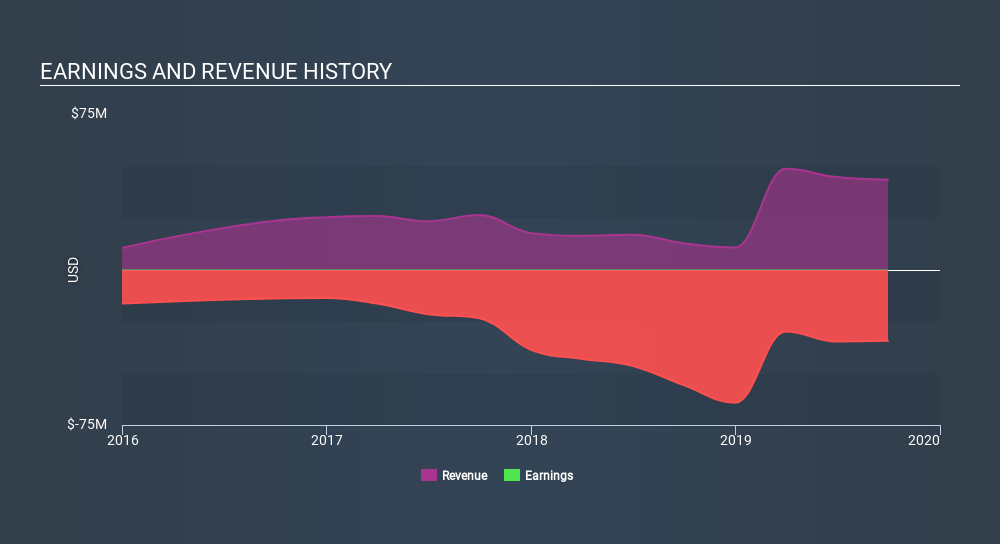- United States
- /
- Biotech
- /
- NasdaqGS:MRSN
What Kind Of Shareholder Owns Most Mersana Therapeutics, Inc. (NASDAQ:MRSN) Stock?

Every investor in Mersana Therapeutics, Inc. (NASDAQ:MRSN) should be aware of the most powerful shareholder groups. Institutions often own shares in more established companies, while it's not unusual to see insiders own a fair bit of smaller companies. Companies that have been privatized tend to have low insider ownership.
Mersana Therapeutics is not a large company by global standards. It has a market capitalization of US$355m, which means it wouldn't have the attention of many institutional investors. Our analysis of the ownership of the company, below, shows that institutions own shares in the company. Let's delve deeper into each type of owner, to discover more about Mersana Therapeutics.
See our latest analysis for Mersana Therapeutics

What Does The Institutional Ownership Tell Us About Mersana Therapeutics?
Institutions typically measure themselves against a benchmark when reporting to their own investors, so they often become more enthusiastic about a stock once it's included in a major index. We would expect most companies to have some institutions on the register, especially if they are growing.
We can see that Mersana Therapeutics does have institutional investors; and they hold 40% of the stock. This implies the analysts working for those institutions have looked at the stock and they like it. But just like anyone else, they could be wrong. It is not uncommon to see a big share price drop if two large institutional investors try to sell out of a stock at the same time. So it is worth checking the past earnings trajectory of Mersana Therapeutics, (below). Of course, keep in mind that there are other factors to consider, too.

It looks like hedge funds own 18% of Mersana Therapeutics shares. That's interesting, because hedge funds can be quite active and activist. Many look for medium term catalysts that will drive the share price higher. Our data shows that New Enterprise Associates, Inc. is the largest shareholder with 25% of shares outstanding. Next, we have BVF Partners LP and Sarissa Capital Management LP as the second and third largest shareholders, holding 10% and 7.8%, of the shares outstanding, respectively.
On studying the facts and figures more closely, we found that the top 5 shareholders control 53% of the company which implies that this group has considerable sway over the company's decision-making.
Researching institutional ownership is a good way to gauge and filter a stock's expected performance. The same can be achieved by studying analyst sentiments. There are plenty of analysts covering the stock, so it might be worth seeing what they are forecasting, too.
Insider Ownership Of Mersana Therapeutics
While the precise definition of an insider can be subjective, almost everyone considers board members to be insiders. Company management run the business, but the CEO will answer to the board, even if he or she is a member of it.
Insider ownership is positive when it signals leadership are thinking like the true owners of the company. However, high insider ownership can also give immense power to a small group within the company. This can be negative in some circumstances.
Our data suggests that insiders own under 1% of Mersana Therapeutics, Inc. in their own names. It seems the board members have no more than US$1.6m worth of shares in the US$355m company. Many investors in smaller companies prefer to see the board more heavily invested. You can click here to see if those insiders have been buying or selling.
General Public Ownership
With a 11% ownership, the general public have some degree of sway over MRSN. While this size of ownership may not be enough to sway a policy decision in their favour, they can still make a collective impact on company policies.
Private Equity Ownership
Private equity firms hold a 30% stake in MRSN. This suggests they can be influential in key policy decisions. Sometimes we see private equity stick around for the long term, but generally speaking they have a shorter investment horizon and -- as the name suggests -- don't invest in public companies much. After some time they may look to sell and redeploy capital elsewhere.
Next Steps:
While it is well worth considering the different groups that own a company, there are other factors that are even more important. Like risks, for instance. Every company has them, and we've spotted 4 warning signs for Mersana Therapeutics (of which 2 don't sit too well with us!) you should know about.
If you are like me, you may want to think about whether this company will grow or shrink. Luckily, you can check this free report showing analyst forecasts for its future.
NB: Figures in this article are calculated using data from the last twelve months, which refer to the 12-month period ending on the last date of the month the financial statement is dated. This may not be consistent with full year annual report figures.
If you spot an error that warrants correction, please contact the editor at editorial-team@simplywallst.com. This article by Simply Wall St is general in nature. It does not constitute a recommendation to buy or sell any stock, and does not take account of your objectives, or your financial situation. Simply Wall St has no position in the stocks mentioned.
We aim to bring you long-term focused research analysis driven by fundamental data. Note that our analysis may not factor in the latest price-sensitive company announcements or qualitative material. Thank you for reading.
About NasdaqGS:MRSN
Mersana Therapeutics
A clinical-stage biopharmaceutical company, develops antibody-drug conjugates (ADC) for cancer patients with unmet needs.
Undervalued slight.
Market Insights
Community Narratives




